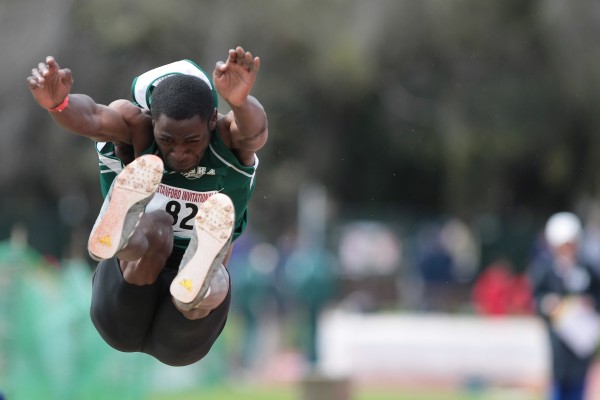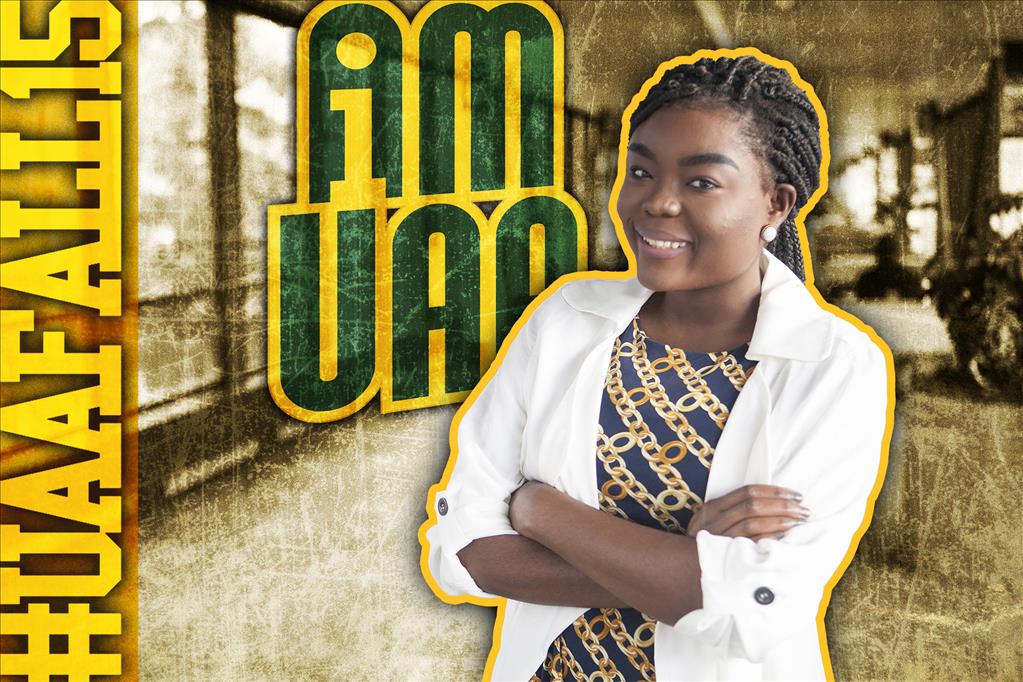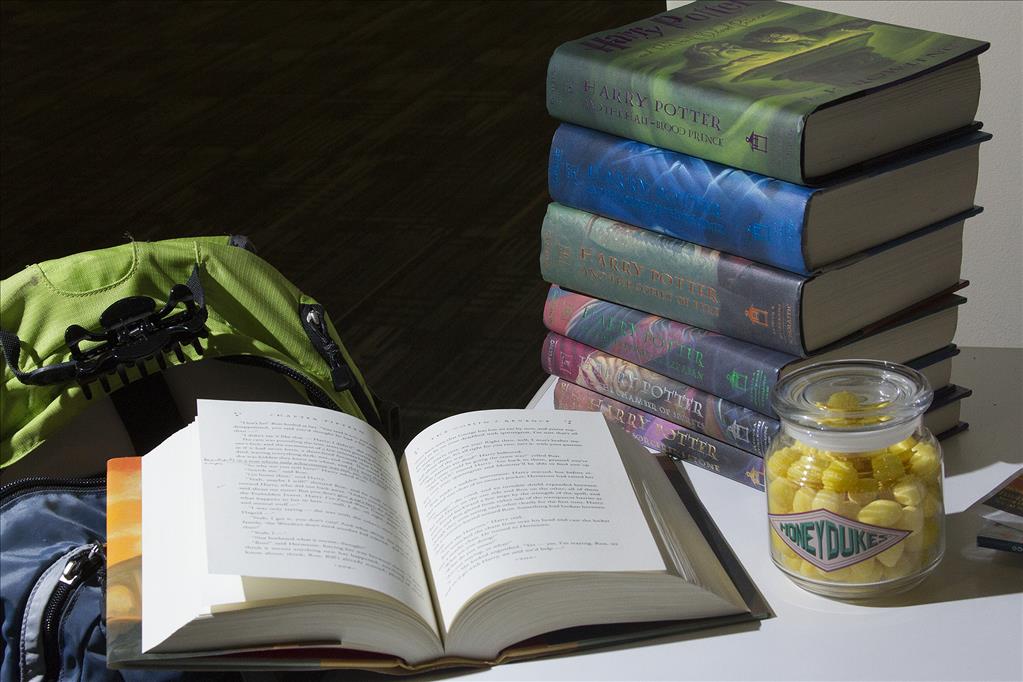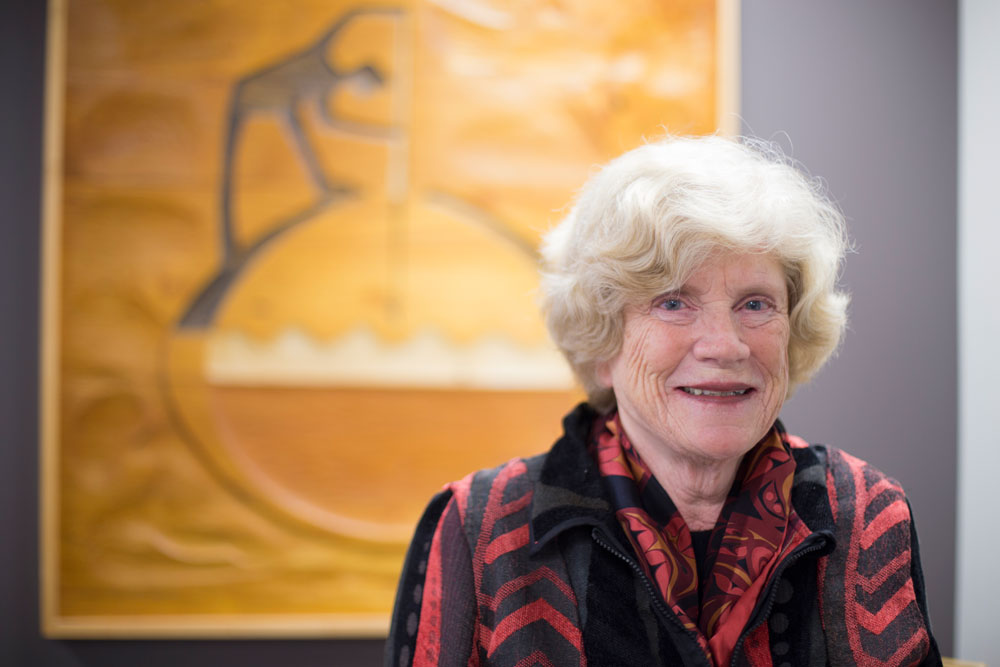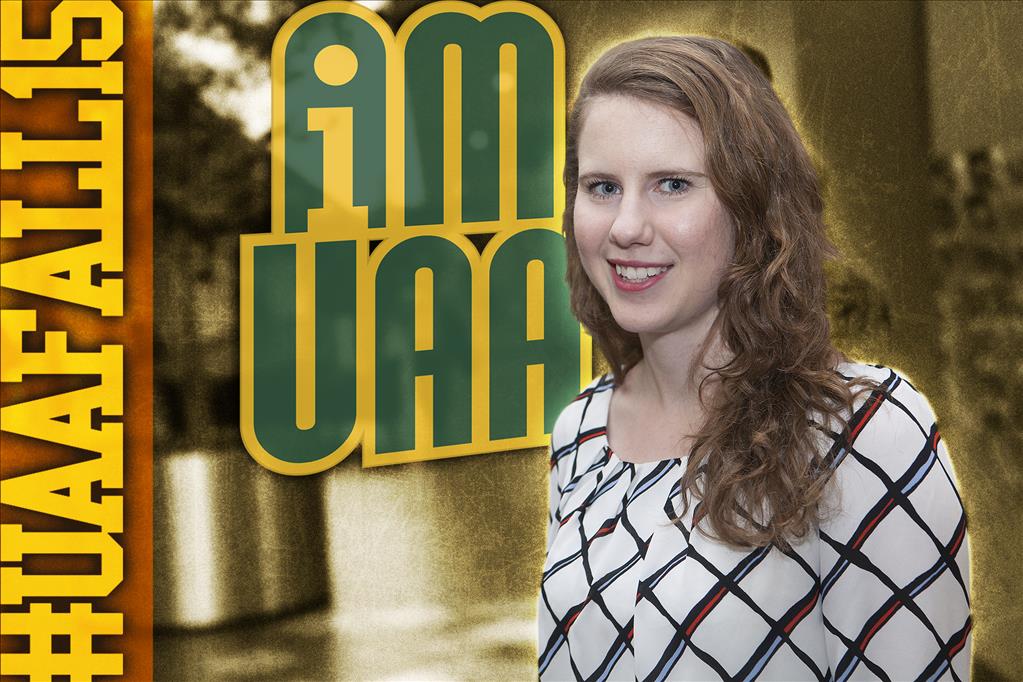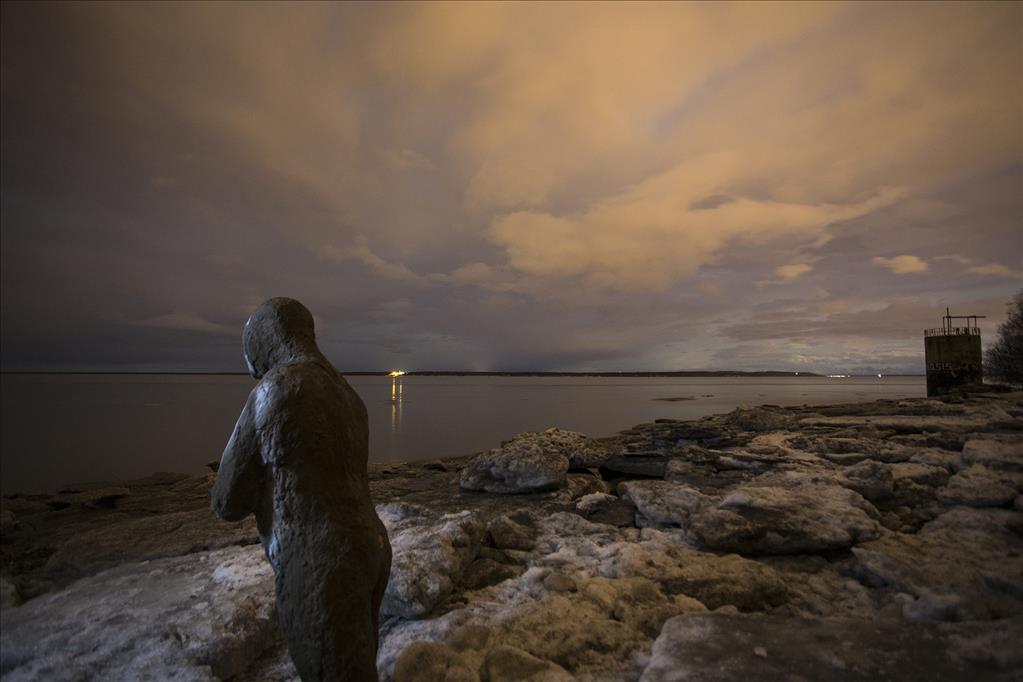Caribbean Olympian?
by joey |
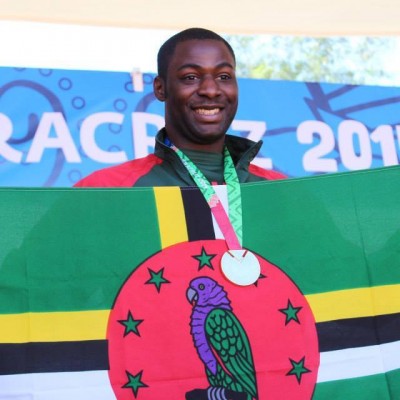
I AM UAA: David Registe-former Seawolf athlete-now competes for the Caribbean nation of Dominica. He recently won a gold medal in long jump at November's Central American and Caribbean Games in Veracruz. (Photo provided by David Registe)
David Registe B.S. Physical Education '11 Hometown: Palmer, Alaska Fun fact: When he's not training, he likes to fly remote control helicopters.
He's still competing in a dark green jersey, he's still training at the Dome in Anchorage, he's even working with the same long jump coach. It looks like former Seawolf athlete David Registe hasn't gone too far since graduating, but his growing collection of international gold medals suggests otherwise.
After trading in his UAA jersey, David adopted dual citizenship with Dominica-his parents' birthplace-and has been competing for the Caribbean nation on the world stage ever since.
Throughout his career, David has slashed records and reaped accolades as a powerhouse long jumper. After taking back-to-back state titles in long jump for Colony High, he competed four years under UAA coach Rafael Echavarria.
"We met my freshmen year of college. Without him, I would not be doing track," David said of his close relationship with Rafael-a former decathlete and hurdler for Brigham Young University.
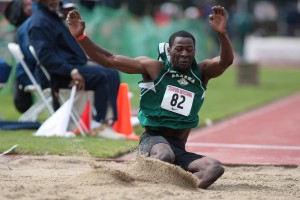
David won the NCAA Division II national championship in long jump as a sophomore. (Photo by Kelley L Cox)
David won nationals in long jump as a sophomore, becoming the track program's first national champion, and Rafael started to consider David's potential on the international scene. When it was time for David to graduate, Rafael decided to leave as well. The pair now spends the majority of their week together training at the Dome.
"We are straight up partners in crime," David laughed. "If it wasn't for him, I'm not going anywhere because I would never be able to get better. He does all the research. He does all of the work. I just show up and listen."
Dominican roots
David was born and raised in Palmer, but both his parents come from Dominica-a lush Caribbean island home to waterfalls, hot springs, curvy coastal roads and long sunny days. Small colorful homes sprinkle the hillsides, clinging to the island's steep volcanic cliffs that jut straight out of the sea. The island occupies just 290 square miles of Earth's real estate (for comparison's sake, the Municipality of Anchorage is 17 times larger than the entire country of Dominica).
After four years together, Rafael was well aware of David's potential and wanted to help him to the next level. But in the hyper-competitive American track scene, only top athletes get any attention and support. "It's a sport you have to grow into physically, mentally," Rafael explained. By tapping into David's Caribbean roots, Rafael hoped to give David time to develop.

David trained at Windsor Park-Dominica's national stadium, primarily used for cricket matches. (Photo by J. Besl)
During his senior year, David traveled to Dominica over Christmas break to meet the country's athletic committee. He stayed at his aunt and uncle's house in the capital city of Roseau and turned heads by sprinting and leaping at the nation's main stadium, primarily used for international cricket matches.
The trip was a success. Dominica was interested, David applied for dual citizenship and he's been a professional athlete ever since. "They took a shot at me and let me compete for them, which is awesome," he said.
Grit, commitment and Dominica's support have propelled David from off-the-radar Alaskan to international champion. "From his senior year of college to now, he's improved tremendously," Rafael said. "Right now he's ranked number 33 in the world."
That news came as a surprise. "Really?" David reacted, swiveling his head toward his coach. The next bombshell-within the United States, he's ranked number 5.
Training days
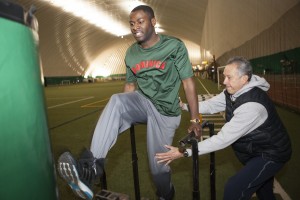
Rafael assists David during a recent conditioning day at the Dome. (Photo by Philip Hall/University of Alaska Anchorage)
"I've been pretty much living in here," David said looking out across the Dome-Anchorage's cavernous cathedral of athletics.
Long jump is now David's full-time job, and he certainly puts in the hours. Six days a week he's at the Dome at 8 a.m. for a three-hour morning session. He returns at 1:30 p.m. to lift weights, and at 3 p.m. he coaches alongside Rafael for the Alaska Running Academy-a citywide team of top-tier high school students who also train at the Dome.
David and Rafael rotate their focus throughout the week. Mondays, Wednesdays and Fridays are conditioning days on the track, with Tuesdays and Thursdays set aside for jumping drills and weights. Saturday is the only day he actually jumps, but even then it's a shorter sprint to a springboard. By reducing the force of takeoff, David is able to fit in 15 or so jumps each Saturday without pounding off the ground. "It allows me to do a lot more at practice," he explained.
If he's not training, it's likely he's traveling to a national meet in California or Oregon. But more and more frequently, it's just as likely he's headed to an international meet as well.
Grabbing gold in Mexico City
Long jump is a game of inches, and David's progress has been equally incremental. He's improved his technique since college and keeps clearing more incredible distance thresholds. At UAA, he set a personal record at the 2009 NCAA Championships of 25' 11.5". He's since climbed to 26' 5.5." Those six inches may seem like small potatoes, but consider he's now jumping the length of a Lincoln limousine or the Oscar Mayer Wienermobile.
He's currently working on gaining an inch and a half extra. "If I get 26'7" that will send me to China for the world championships [in August 2015] and it will get me into the Olympics in Rio," David said. "So that'd be my mark for punching both tickets."
International long jump-like most things-is measured in the metric system, and that 26'7" translates to about 8.1 meters. "8 meters is kind of like the golden threshold," explained Rafael. "If you go 8 or better then you become one of the elite jumpers."
David first hit the 8-meter mark in August 2014 at the Pan American Festival. It was a major turning point in his career.
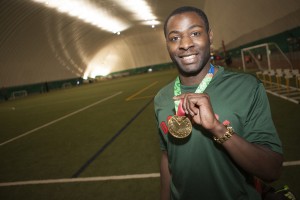
David's victory at the Central American and Caribbean Games was the second gold medal of his professional career. (Photo by Philip Hall/University of Alaska Anchorage)
It was a sunny day in Mexico City when David tore down the runway for his second of three jumps. He could feel himself over-rotating in the air-Rafael could see it from the sidelines, too-and they talked it over after David picked himself up from the sand. Then the score dropped. David had just launched 8 meters, 4 centimeters. Rafael scrapped his advice and just told him to do it again. He cleared 8 meters 6 centimeters on his final jump, setting a personal record, collecting his first gold medal and qualifying for the 2015 Pan American Games in Toronto.
"I knew I could do it the whole time, but now I've actually done it," David said. "It feels good to finally join that 8 meter club, because we've wanted that 8 meter club for literally 5, 6 years. So the first time we hit it-everything was in slow motion. It was surreal."
He followed up his performance in November with another gold at the Central American and Caribbean Games-a 26-nation, 4,000-athlete event-which he entered as the top-ranked long jumper.
"It's been a long road to get to 8 meters but now, it's a big satisfaction because he's getting to that level," Rafael smiled.
Punching his ticket to Worlds
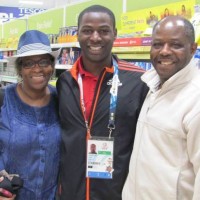
David's parents traveled to the Commonwealth Games in Scotland last summer to see their son represent their home country. (Photo provided by David Registe)
His parents are beaming with pride, too. "They brag about me all the time, they love it," David laughed. His parents even traveled to Scotland to see him compete in a Dominican jersey at the 2014 Commonwealth Games. "My mom hadn't even seen me compete throughout my entire college career, so for her to see me all of a sudden from high school to now-an international athlete-that's funny."
He's already qualified for the 41-nation Pan American Games in Toronto this July-now, his sights are set on reaching the World Championships in Beijing this August. Until then, David will keep working on reaching those extra inches and Rafael will keep watching tapes and advising on technique.
Who knows? Maybe David will be the next UAA athlete to bring a bit of Seawolf spirit to the Olympic Games.
Read more about David at GoSeawolves.com.
Written by J. Besl, UAA Office of University Advancement
 "Caribbean Olympian?" is licensed under a Creative Commons Attribution-NonCommercial 4.0 International License.
"Caribbean Olympian?" is licensed under a Creative Commons Attribution-NonCommercial 4.0 International License.










